|
|
|
Sort Order |
|
|
|
Items / Page
|
|
|
|
|
|
|
| Srl | Item |
| 1 |
ID:
171791
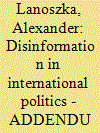

|
|
|
| 2 |
ID:
171785
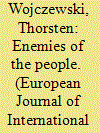

|
|
|
|
|
| Summary/Abstract |
Populists are on the rise across the globe and claim to speak on behalf of ‘the people’ that are set against the establishment in the name of popular sovereignty. This article examines how populist discourses represent ‘the people’ as a referent object that is threatened and the form and implications of this populist securitisation process. Drawing on securitisation theory and poststructuralism, the article understands populist securitisation as a discursive practice that propagates a politics of fear, urgency, and exceptionality in order to mobilise ‘the people’ against a ‘dangerous’ elite and normalise this antagonistic divide of the social space. While the proposed theoretical framework aims to clarify the relationship between poststructuralist and securitisation theory and capture the nexus between populism and security, the case of populism broadens the scope of potential subjects of security and poses important challenges to existing theoretical assumptions about security as something designated by states’ representatives and ‘security experts’. The article develops and illustrates its arguments with a case study on the (de)securitisation moves in the populist discourse of Donald Trump.
|
|
|
|
|
|
|
|
|
|
|
|
|
|
|
|
| 3 |
ID:
171788
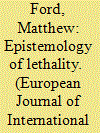

|
|
|
|
|
| Summary/Abstract |
The science of ammunition lethality is a field that seeks to define the point at which military ordnance takes life and produces death. By historicising lethality's epistemology, I reveal the intellectual fissures and scientific uncertainties that have been reified and embedded into contemporary conceptions of military power. This not only tells us something about the processes by which science is subordinated to war, but also offers a new lens from which to consider the way knowledge claims about battle are co-constructed and legitimated through military practices. As a result, this article places science back into a narrative that otherwise frames the ontology of war in terms of fighting.
|
|
|
|
|
|
|
|
|
|
|
|
|
|
|
|
| 4 |
ID:
171789
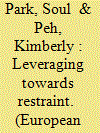

|
|
|
|
|
| Summary/Abstract |
The emergence of new nuclear aspirants has posed a great threat to the post-Cold War global non-proliferation regime. These states have adopted a nuclear hedging strategy that has been deemed both strategically risky and politically difficult to maintain. Yet, hedging has not automatically resulted in nuclearisation. We analyse the conditions under which a nuclear hedger shifts its nuclear policy towards one of restraint. Drawing insights from prospect theory, we argue that a nuclear policy shift occurs when a nuclear hedger gains an asymmetric leverage vis-à-vis its adversary. Specifically, a hedging strategy that is based on loss aversion will only be abandoned when a shift in the nuclear aspirant's reference point occurs during negotiations. To test our theoretical arguments, we conduct an in-depth case study of North Korea's nuclear policies throughout the 1990s and 2000s. The empirical study of the changes in North Korea's negotiating stance during the Agreed Framework negotiations and the Six-Party Talks supports our asymmetric leverage thesis. We conclude with broad policy implications for the non-proliferation regime.
|
|
|
|
|
|
|
|
|
|
|
|
|
|
|
|
| 5 |
ID:
171787
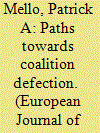

|
|
|
|
|
| Summary/Abstract |
Despite widespread public opposition to the Iraq War, numerous democracies joined the US-led multinational force. However, while some stayed until the end of coalition operations, and several increased their deployments over time, others left unilaterally. How to explain this variation? While some studies suggest that democratic defection from security commitments is primarily motivated by electoral incentives or leadership change, scholars have not reached a consensus on this issue. To account for the complex interplay between causal factors, this article develops an integrative theoretical framework, using fuzzy-set Qualitative Comparative Analysis (QCA) on original data on the Iraq War involvement of 51 leaders from 29 democracies. The findings document the existence of multiple paths towards coalition defection. Among others, the results show that: (1) leadership change led to early withdrawal only when combined with leftist partisanship and the absence of upcoming elections; (2) casualties and coalition commitment played a larger role than previously assumed; and (3) coalition defection often occurred under the same leaders who had made the initial decision to deploy to Iraq, and who did not face elections when they made their withdrawal announcements.
|
|
|
|
|
|
|
|
|
|
|
|
|
|
|
|
| 6 |
ID:
171790
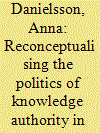

|
|
|
|
|
| Summary/Abstract |
Peacebuilding debates increasingly revolve around questions about knowledge and expertise. Of particular interest is what (and whose) knowledge(s) ends up authoritative in interventions. This article addresses a problem in the literature on the epistemics and epistemic authority of peacebuilding interventions: the acknowledgement of but lacking attention to plural knowledges, the transgressive character of expertise, and knowledge struggles. It does this by discussing recent suggestions that peacebuilding epistemic authority can be fruitfully analysed as a Bourdieusian field. The article identifies a tension in Bourdieu's own thinking about fields, which has shaped some of these recent proposals. This tension, nevertheless, also enables a reconsideration of fields and struggles, and thereby an analysis that takes plurality and transgressiveness into account. By developing such an alternative conceptual position, the article sees peacebuilding epistemic authority as object- and struggle-bound; conditioned and dependent on dynamics that go beyond peacebuilding as a distinct field of practice. This position is illustrated in an analysis of the emergence and (temporary) establishment of epistemic authority in peacebuilding interventions on informal economies.
|
|
|
|
|
|
|
|
|
|
|
|
|
|
|
|
| 7 |
ID:
171786


|
|
|
|
|
| Summary/Abstract |
These days, when we hear the slogan ‘let's make our country great again’ we almost automatically assume the state concerned is the US, and the leader uttering the slogan is President Trump. This article invites readers to explore the discourse and practices through which another national leader is seeking to restore his country's ‘greatness’ and promote national and international security. The leader concerned is France's Emmanuel Macron. Why focus on the French president? Because since his election he has become the most dynamic European leader, on a mission to enhance France's international stature, and to do so via a broader process of protecting and empowering the EU. More broadly, France stands out as a country whose political leadership has long been committed to the goal of playing a global role. As Pernille Rieker reminds us, ‘Since 1945, French foreign policy has been dominated by the explicit ambition of restoring the country's greatness [la grandeur de la France], justified in terms of French exceptionalism’
|
|
|
|
|
|
|
|
|
|
|
|
|
|
|
|
|
|
|
|
|